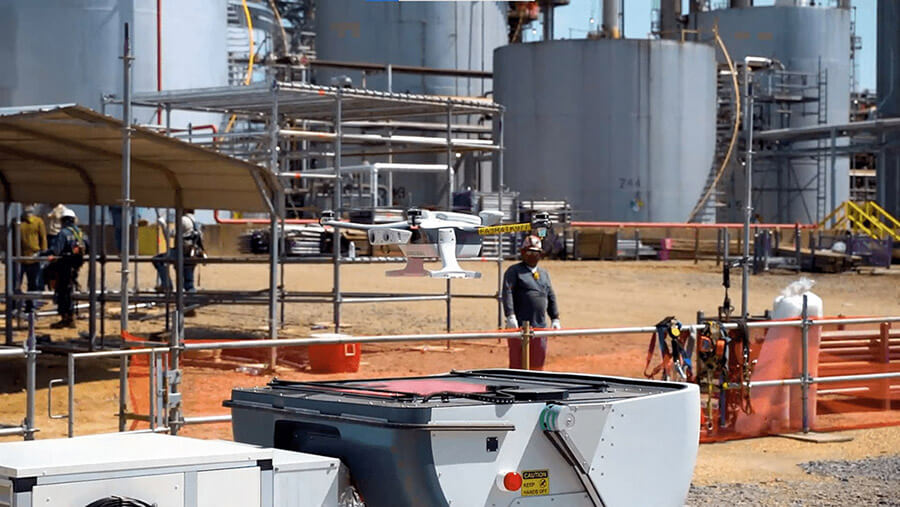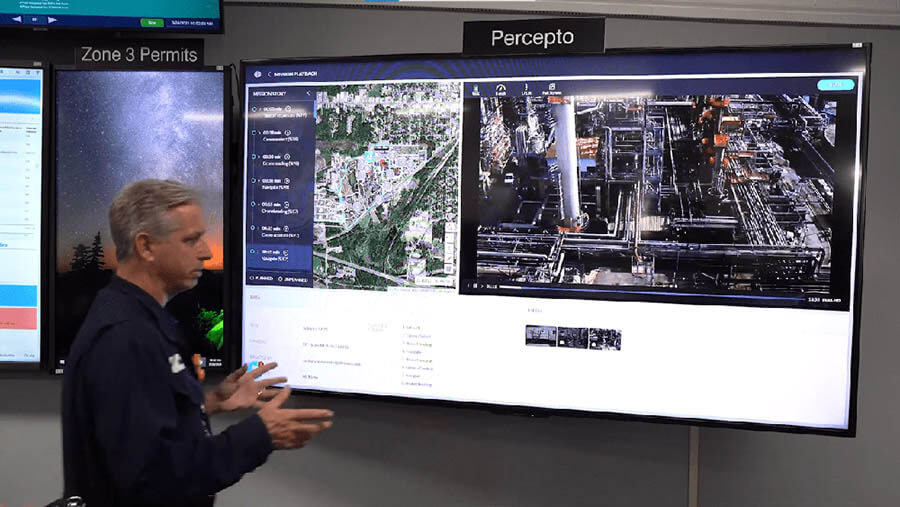Any time an oil or gas refinery appears on a television show or movie, you know an explosion of some sort is about to occur.
While Hollywood is all about drama, it is true that oil or gas refineries are potentially dangerous places. For employees, nearby residents and the environment alike, risks like hazardous chemicals, leaks and fires pose a serious threat. But, while Hollywood is all about doom and gloom, today’s refineries are redefining the way they manage risks.
The most innovative oil and gas companies are ramping up inspections and quality control on critical assets and infrastructure, constantly monitoring for failures, leaks and potential hazards. But instead of sending in employees to perform these inspections, autonomous robots are dispatched – with site employees safely monitoring from their laptops.
Delek US for example, is reframing the way their refineries are managed. Their program, refinery of the future, aims to integrate several disruptive technologies such as autonomous drones, to make their refineries more productive, safer and more environmentally friendly.
Why refinery inspection and maintenance is so critical
For any industrial facility, inspections empower preventive maintenance, which minimizes failures and costly downtime. So, the more frequently you inspect your facility, and the higher quality inspections you implement, the more productive your facility will be – translating to millions of dollars per year. A refinery is no exception. A typical refinery with around 75K barrels of crude oil per day throughput capacity stands to see around $2M in ROI by optimizing their site inspections.
Automating refinery inspections is critical because:
- Manual inspections are timely, costly, infrequent and often ineffective – yet many oil & gas refineries still rely on this “tried and true” method to monitor their facilities.
- A refinery is a hazardous work environment, and safety is a top priority. Sending an employee out for regular inspections and repairs is risky, and requires special approvals and work permits.
- Companies strive to ensure their refineries are energy efficient, with minimal impact in areas such as air pollution, water usage and waste.
Keep your employees and your facility safe with automated inspections
A simple inspection of a refinery including the oil tanks, flares, pipes, etc. can be dangerous for employees. By using autonomous drones and robots for inspection, employees can be kept out of harm’s way and focus on other aspects of their job.

Meanwhile, drones and robots conduct a thorough inspection. They can quickly and safely inspect tanks, confirming tank integrity – inspecting for dents, unclosed hatches, leaks, objects on the rooftops, corrosion, fenceline monitoring, etc. Besides inspecting for leaks of roofs and pipes, drones and robots do a general sweep of a facility, inspecting the ground and surrounding water for oil sheens. Pipe inspection analyzes structural integrity and detects leaks and temperature discrepancies that may suggest an error.
With live streaming of inspections, site managers don’t even have to be physically present on-site to stay on top of all pertinent activity at the oil and gas refinery. In addition, Percepto’s drones and robots automatically provide insights and generate data that is available for stakeholders’ review, regardless of where they are.
Authorized users can also review all past missions, reports and maps stored on the cloud. This helps personnel track potential issues and note relevant changes on the ground to assess needs.
Save time, increase productivity and minimize environmental footprint
Not only is sending an employee out for regular inspections and repairs risky, but it time consuming. Due to the risk involved, refineries often require special approvals and work permits to allow an employee to safely inspect a tank for example. That means they need to prove an inspection is required, put in the request, and wait for the inspection to be scheduled. All of this is time-consuming, often leads to ad-hoc inspections, and takes up valuable employee time.
Our calculations conclude that autonomously inspecting critical oil and equipment gas for mechanical integrity can result in a 90% time savings, leading to significantly reduced costs and increased productivity. Plus, more frequent site inspections ensures site assets are in top shape, reducing risk of costly delays and shutdowns.
By having frequent inspections and staying on top of matters, refineries can minimize their environmental footprint. Maintenance teams can quickly respond to issues and keep the refinery operating as energy efficient as possible. This maximizes uptime and streamlines environmental compliance.
Automated inspections in action at Delek US refinery
In 2020, Delek US, a downstream energy company with assets in multiple areas including petroleum refining, integrated Percepto drones. This is part of their goal of building the refinery of the future by investing and integrating advanced technologies and management tools. They said of the drones, “These drones keep us from climbing high towers; they go inside vessels, check on floating roofs in the tank farm, and observe pipeline routes.” All of this minimizes safety risks for employees.

Percepto drones bring Delek US actionable insights via monitored data across a range of tough industrial settings. They also use drones to perform remote infrastructure inspection and anomaly detection multiple times per day and/or night of petroleum refineries.
Plus, autonomous robots can be invaluable when emergencies arise as they provide facility safety and response teams unparalleled situational awareness. Emergencies can be tracked and monitored without putting site employees in harm’s way, thus keeping them safe. Delek US views the Percepto drone as part of their emergency response program and has found they offer them better visibility, better decisions, and better safety.
Incorporating the drone into the emergency response program has led to a boost in employee morale at Delek US. “Between our cross functional team of volunteers from Maintenance, Environmental, EMS, Engineering and Operations, you could tell the pride in this exciting new program is tremendous!”
Automated inspections are accurate. Because they can be done quickly and easily, inspections typically happen more frequently. And the benefits – keeping employees and the refinery safer, increased productivity, and minimizing a refineries’ environmental footprint – are many. Plus, drones and robots are instrumental during emergency situations and can help limit the damage. It’s no wonder that top oil and gas companies are automating inspections at their refineries.





